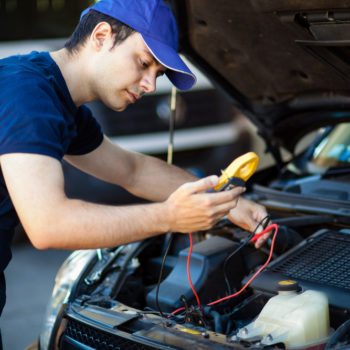Why We Love It
-
$33,500Potential Avg. Salary
-
-49.6%Job Growth Rate
-
Dependable Daily WorkloadCareer Attribute
-
Don't Take Work HomeCareer Attribute
Automotive electricians install, maintain and repair electrical wiring, parts and electrical and electronic systems in vehicles.
Recommended Schools
What is an Automotive Electrician?
Duties
As an automotive electrician, you must handle the following responsibilities:
- Diagnose and repair to specifications – brake and hydraulic, exhaust, primary and/or advanced fuel ignition and electrical, suspension and alignment.
- Adequately explain technical diagnoses and needed repairs to non-mechanical individuals which may include employees and customers on an as-required basis.
- Continuously learn new technical information and techniques in formal training sessions in order to stay abreast with rapidly changing automotive technology.
- Performs major overhauls or repairs of complex automotive problems of vehicle fleet & heavy equipment, repair, rebuilds or replaces minor & major parts (e.g., electrical system components, alternators, water or fuel pumps, clutches
- Constantly learning new technical information and techniques through formal training to keep up with rapidly changing automotive technology.
Day In The Life
As an automotive electrician, you’ll be working with multiple parts of the car – all related to the electrical wiring system. This requires good hand-eye coordination, strong eye sight, a thorough methodology of completing work and a desire to keep learning as electrical systems change and upgrade.
Though the work will vary depending on where the automotive electrician is employed, many of the same work skills are needed. Automotive electricians will be working with computer engine management systems, which will help diagnose any problems in the car’s electrical system. Once the problem has been diagnosed, the electrician will complete the repairs to the parts of the electrical system, including the:
- Electronic ignition
- Cruise control
- Fuel injection
- Airbags
- Automatic transmission
- Air conditioning
Now that energy efficient cars are becoming more popular, automotive electricians need to be able to make improvements to electrical systems to improve their overall efficiency. This is a major benefit to many car owners, and having this skill will come in handy as car manufacturers become more focused on more fuel efficiency.
Once the work is completed, the automotive electrician will be in charge of testing the vehicle to make sure that all parts are correctly installed. If any issues come up during the testing process, the electrician will go back and fix those parts and retest them until everything is satisfactory.
Doing all of this work will also require specialized knowledge of certain tools and equipment. Automotive electricians should feel comfortable using power and hand tools in their everyday work, and they should have an extensive knowledge of industry equipment and machines. Some projects will also require soldering and welding, so having this knowledge will help automotive electricians excel in their place of work.
Automotive electricians work with different cars every day, so it’s rare that they ever have the same day twice. If you like a little variety in your work, this may be just what you need.
Work Schedule
You’ll usually work 40 hours a week, Monday to Friday. You might have to work shifts or be on-call. You’ll be based in a garage or workshop. If your job includes call-out duties, you’ll also work outside in all weather conditions. For most electricians, the day lasts from about 8 am until roughly 6 pm. This will vary depending on the employer, but most electricians can expect a 40-hour work week with the possibility of overtime.
Growth Of The Job
With experience, you could progress to be a supervisor or manager, or move into vehicle sales or marketing. You could specialize in light vehicles (cars, vans and motorcycles), heavy vehicles (lorries, buses and coaches), or one particular vehicle model if you work for a motor manufacturer. You could also set up your own business.
Typical Employers
Most automotive electricians go to work for a mechanic’s shop or a dealership. Mechanic shops employ automotive electricians to work on the various cars that come into the shop. This requires a strong knowledge of a lot of different makes and models.
Dealerships need highly trained automotive electricians who know their products extremely well. Customers often bring in their cars to have them serviced, and they expect high quality work. These electricians need to have solid knowledge on the makes and models of the dealership. If the electrician is working for a used car dealership, then he or she needs to be able to fix up older cars and make them sellable once more.
Recommended Schools
How To Become an Automotive Electrician
There are no specific requirements to become an automotive electrician. However, employers usually prefer you to have a qualification and full driver’s licence for the type of vehicle you are working on.
You could do a vehicle maintenance and repair college course that also covers auto electrical work and get into this career through an apprenticeship. You may need a driving licence that includes LGV (lorries) or PCV (buses), if you work with these vehicles.
Automotive Electrician Salary Data
We’ve provided you the following to learn more about this career. The salary and growth data on this page comes from recently published Bureau of Labor Statistics data while the recommendations and editorial content are based on our research.
National Anual Salary
Low Range
$24,000Average
$33,500High Range
$50,940National Hourly Wage
Low Range
$12/hrAverage
$16/hrHigh Range
$24/hrHow do Automotive Electrician salaries stack up to other jobs across the country? Based on the latest jobs data nationwide, Automotive Electrician's can make an average annual salary of $33,500, or $16 per hour. This makes it an Above Average Salary. On the lower end, they can make $24,000 or $12 per hour, perhaps when just starting out or based on the state you live in.
Salary Rankings And Facts
#646 Nationally for All Careers
Highest Education Among Automotive Electricians
- 0% Doctorate
- 0.4% Masters
- 5.4% Bachelors
- 10.2% Associates
- 28.3% College
- 38.1% High School
- 17.7% Less than High School
Job Growth Projections and Forecast
2014 Total Jobs
11,5002024 Est. Jobs
5,800Job Growth Rate
-49.6%Est. New Jobs
-5,700How does Automotive Electrician job growth stack up to other jobs across the country? By 2024, there will be a change of -5,700 jobs for a total of 5,800 people employed in the career nationwide. This is a -49.6% change in growth over the next ten years, giving the career a growth rate nationwide of Below Average.
Growth Rankings And Facts
#818 Nationally for All Careers
What Companies Employ The Most Automotive Electricians
| Industry | Current Jobs | New Jobs Needed | % Increase |
|---|---|---|---|
| Electronics and appliance stores | 3,900 | -2,100 | -2% |
| Automotive parts, accessories, and tire stores | 2,900 | -1,400 | -1% |
| Motor vehicle body and trailer manufacturing | 800 | -400 | 0% |











